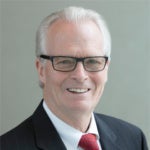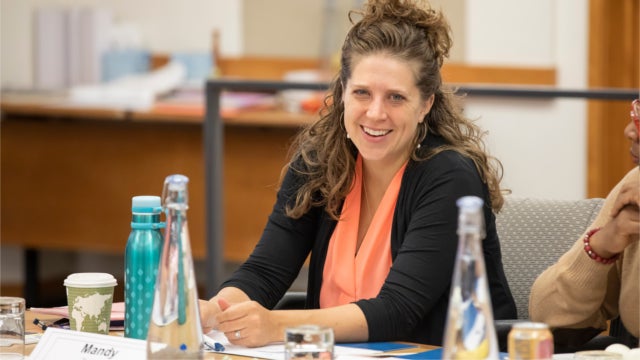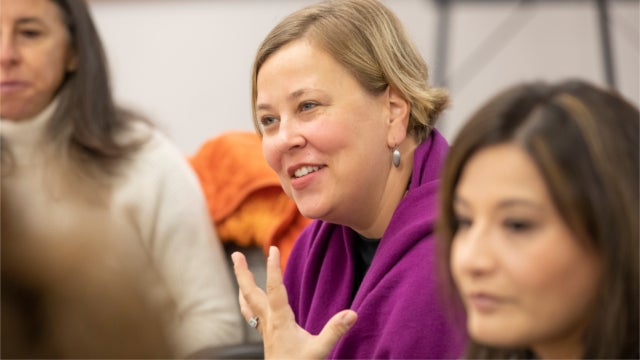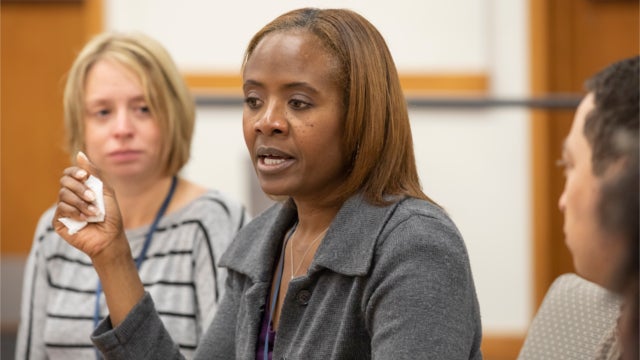We are facing a historically tight labor market, and unemployment numbers are low. But unfortunately, low unemployment doesn’t mean people are doing well. In fact, as many as 50 million American households do not have the income to support a family. Economists speak positively about 3.1% median wage growth, but a typical entry-level worker making $12 an hour could get a 3.1% annual increase every year for 15 years and still not make enough to afford basic living expenses for a family.
With jobs plentiful, we have an opportunity to bring new workers into this economy. To invest in people and help the current workforce become more skilled and more productive. To pay a decent wage, provide a safe place to work, and foster a culture where workers’ contributions matter, because a good job is a competitive advantage.
Across 33 communities, the National Fund for Workforce Solutions activates employers to make jobs better. A good job is a competitive advantage, but job quality is not one-size-fits-all. Our dynamic job quality definition reflects the unique needs and challenges of employers and workers. The National Fund’s Job Design Framework presents options that can be combined in various ways to design a better job. This approach meets employers where they are and supports them along a continuum of improvement.
The National Fund is currently working directly with about a third of our partner communities on job quality initiatives. Local workforce development leaders have a significant role to play by serving as conveners, facilitators, and advocates for good and better jobs. An employer may approach a workforce development organization to say, “I need more workers, because I’m losing people,” creating an opportunity to ask questions and begin a conversation around job quality. Once employers start to make changes and address challenges for their workers, they rely on workforce development professionals who know the local ecosystem of support services and the community-based organizations that provide them.
The Aspen Institute’s Job Quality Fellows
Four of the Aspen Institute Economic Opportunities Program’s Job Quality Fellows focus on workforce development and bring innovative approaches to their work. They not only prepare workers for good jobs, but also convene and partner with policymakers and business leaders to help improve the quality of jobs in their communities.
- Mandy Townsend leads JVS Boston’s efforts to develop relationships with employer partners, especially around job quality. By partnering directly with businesses and charging fees for services, JVS can more directly influence businesses to ensure that people are placed in quality jobs. The organization uses a benchmarking tool to identify and prioritize potential business partners that can offer high-quality employment opportunities for program participants. To facilitate conversations with employers and build trust that leads to strong partnerships, JVS Boston has also developed an employer engagement guide for its staff.
- Rebecca Kusner is a job quality connector in Cleveland. She brings together the philanthropic, government, nonprofit, and business communities to give an equal focus to the needs of workers as much as the needs of businesses. As vice president, workforce solutions and innovation, at Thomas P. Miller and Associates, she draws on her experience and relationships in the community to help workforce stakeholders understand job quality and consider it as part of their larger strategy. Rebecca approaches job quality with a racial equity lens and shares data on racial gaps in income and opportunity and supports partners to disaggregate data by race.
- In Cincinnati, Mardia Shands helps employers understand the return on investment of quality jobs—by speaking their language. Mardia talks with business leaders about improving their competitive advantage through investments in their workforce. Although she’s now at TriHealth, Mardia previously led the National Fund’s Cincinnati collaborative, Partners for a Competitive Workforce. She worked with businesses to implement practices to help stabilize and retain entry-level workers by addressing transportation challenges, for example, or reducing the time until workers are eligible for health insurance.
- Caryn York is working to address racial disparities in Baltimore, both through job training and advocating for changes that confront systemic barriers to opportunities. Her organization, Job Opportunities Task Force, builds connections to employment opportunities through programs such as pre-apprenticeships, while also leveraging relationships with employers to help them better understand the value of quality jobs. JOTF goes beyond traditional workforce strategies to transform the systems and policies that perpetuate barriers and inequities. For example, JOTF recently worked with policymakers and played a role in the expansion of sick leave in Maryland.
Thriving Workers, Businesses, and Communities
These Fellows’ work demonstrates how workforce leaders can improve job quality by working with businesses and policymakers in their communities. And we know that the time is right. The current tight labor market means that businesses are increasingly open to considering the challenges faced by their current and future workforce, how these challenges affect recruitment and retention, and what they can do about it. The Job Quality Fellows have adopted a range of innovative strategies to engage, educate, and partner with employers to help them see job quality as an investment in their business and in their community. We’re excited to continue to collaborate with and learn from these leaders as they work to expand economic opportunity for all.
Meet the Fellows
Share
Tweet A good job is a competitive advantage. By uniting the needs of workers & businesses, workforce development leaders (like the @AspenWorkforce #JobQuality Fellows) play a significant role in advocating for good and better jobs.
Tweet We have an opportunity to bring new workers into this economy, invest in advancement, pay a decent wage, provide a safe place to work, and foster a culture where workers’ contributions matter.
Tweet Quality jobs are an investment in your business and community. The @AspenWorkforce #JobQuality Fellows have adopted a range of innovative strategies to engage, educate, and partner with employers to create good jobs.
Tweet Unemployment is low, but that doesn’t mean people are doing well. Up to 50M households don’t make enough to support a family. This economy isn’t working for everyone, and we need to change that.
About the Author

Fred Dedrick is the president and CEO of the National Fund for Workforce Solutions and is responsible for implementing the mission and vision of the National Fund to strengthen communities, develop employer leaders, promote workforce innovations, and generate good jobs. Mr. Dedrick joined the National Fund at Jobs for the Future as its first executive director in March of 2010. Mr. Dedrick became the National Fund’s first president and CEO in 2016. Mr. Dedrick has more than 30 years of experience in addressing communities’economic and workforce needs, including improving workforce development through partnerships. Most recently, he served as Pennsylvania’s deputy secretary for Workforce Development, overseeing roughly $150 million in federal and state workforce funding. He also served on the executive committee of JOIN, Philadelphia’s regional collaborative supported by the National Fund. Prior to his tenure as deputy secretary, Mr. Dedrick was the executive director of Pennsylvania’s statewide Workforce Investment Board, developing recommendations for Governor Ed Rendall regarding workforce policy and strategy. He has also held various leadership roles statewide and in Philadelphia that involved attracting new businesses, developing industry-specific education programs, and engaging in other workforce-related activities. Mr. Dedrick earned his bachelor’s degree in English from the University of Notre Dame and his master’s in public administration from Princeton University. He currently serves on the leadership council of the National Skills Coalition and the Department of Commerce’s Council on Innovation and Entrepreneurship.
Keep in touch
Learn how the Economic Opportunities Program is helping low- and moderate-income Americans thrive in a changing economy. Follow us on social media and join our mailing list to stay up-to-date on publications, blog posts, and other announcements.





